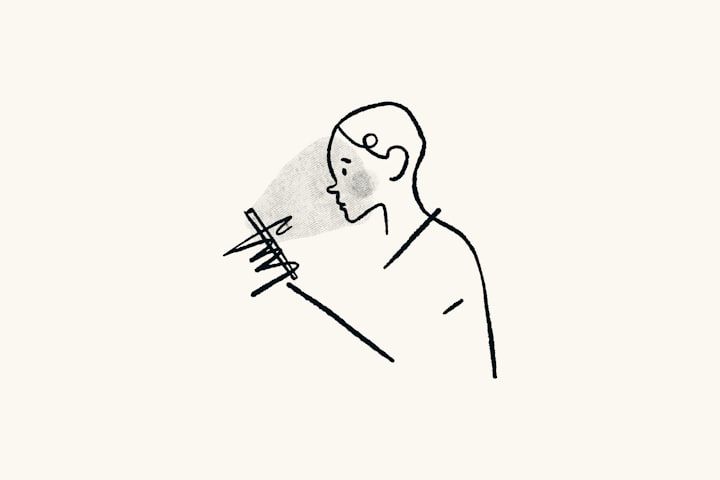Forget Single-Use Plastics, People are the New Disposable Commodity.
Life in this emotionally-charged era means getting deleted, cancelled, ghosted and forgotten. How can we change that?
The Great Divide began in the Trump era with news outlets and late-night television picking apart everything the administration did, and we all pulled up our seats, grabbed our popcorn and laughed, clicked, shared and liked it. We were the majority, and we had no time to try to understand anyone that was "for" that type of behaviour. We shut it down. We blocked it. We refused to go there.
The Me Too movement came next and felt empowering as we cancelled dirt bags like Harvie Weinstein, Bill Cosby and Kevin Spacey. We rejoiced in outing and vilifying those monsters and for good reason too. But the cancel train moved onto the COVID era and an earth-shattering divide separated ourselves and our loved ones over the Great Debate (ahem, vaccines). The media paved the way for us in these previous controversies so we were well versed on what to do with the contention du jour. By applying those same tools they used on celebrities, we were able to seamlessly oust our families, friends and co-workers alike.
Since the summer of 2021, I've watched as women in their forties publicly boast in Mean Girls fashion that they've deleted a dozen or so people off their friend list because, "they can't even." I've witnessed friends post about being kind to others while personally hiding me from their social media page so they don't have to see my differing opinion to their own. I've removed myself from Mom groups where I felt ganged up on for offering another opinion to parenthood that was met with angry retorts and a reminder to check group rules. I've watched as my own friend list shrinks by one or two, each time I post anything other than pictures of my family or happy news. Sometimes it takes months before I see who it was, and I'll never know why, because in this era we can just dispose of people rather than let them know how we feel, or better yet, understand that an opinion that differs from our own is actually beneficial to our growth. We should never strive to live in an echo-chamber of our making.
We tend to think this drama only affects a certain social-media savvy demographic, however it spans from kids to seniors alike. When asking my twelve-year-old daughter about her friend she never sees anymore, her response was, "Mom, people can't stay friends forever." Sure, decades later I could get behind that statement, but months? Are we so quick to unsubscribe to a friendship now that it can end as quickly as it began? My own nearly seventy-year-old mother hasn't escaped it either. I watch as she outdoes herself in her volunteer position to ensure she is indispensable for fear of not being needed any longer. What an exhausting feeling to constantly ensure you're giving 110% just so you can continue to be relevant. What has this done to our mental health?
All I can say is that for my own experience wading through these pandemic years, I feel alone. I saw a meme the other day that said "I haven't felt like myself in months and nobody noticed," and I felt that, deeply. When messages of "Happy New Year" are met with crickets, and mentioning several times throughout the year that my mental health has taken a toll is shrugged off and ignored, I retreat more with each passing day. When the cancel culture circles back to you, the first logical thought is to delete yourself in the form of removing your social media account. We've been conditioned to remove anything we don't agree with, and no longer want to be a part of, and apparently that applies to ourselves too.
So when we post our thoughts and opinions that offend others, when we boast about cancelling people that don't agree with us, when we stop answering texts from people we once considered close friends, what we are saying is that we are fine with pushing people to feel alone if it helps our confirmation bias. We can post all day long about kindness and mental health supports, inclusion and recognizing the signs of depression, but we need to recognize that just like cancelling celebrities and politicians that are out there in the public realm, and not in our own personal lives, the posts about being kind to others to avoid mental breakdowns aren't happening to random faceless strangers, but rather to our own family and friends and are likely a result of our own actions.
So when you see a hashtag with "stop the divide," it's time we recognize that it isn't about the media exacerbating a polarizing issue, or even about the government mandates. What #stopthedivide means is getting back to valuing the people in your life, full stop. If something offends you, say so. And not in the comments section where egos flare with the amount of likes and angry faces each response gets. Send a private message. Reach out. Start a dialogue. The next time you go to hit the "unfriend" button when something has triggered anger in you, pause and recall a memory of the person you are wanting to remove from your life, and remember they are there because at one point you valued them, we need to remember that again.
About the Creator
Christina Hunter
Author, Mother, Wife. Recipient of the Paul Harris Fellowship award and 2017 nominee for the Women of Distinction award through the YWCA. Climate Reality Leader, Zero-Waste promoter, beekeeper and lover of all things natural.







Comments
There are no comments for this story
Be the first to respond and start the conversation.